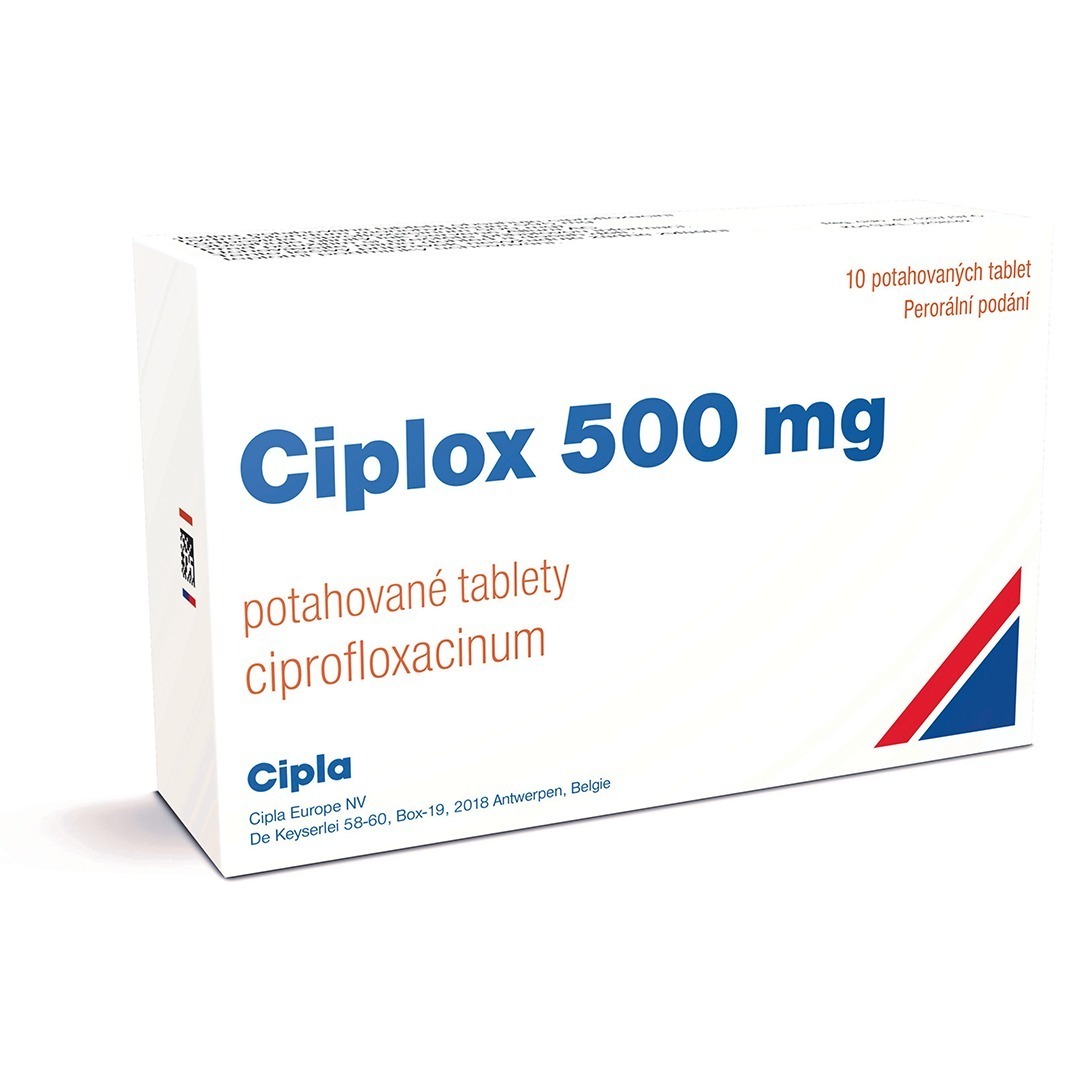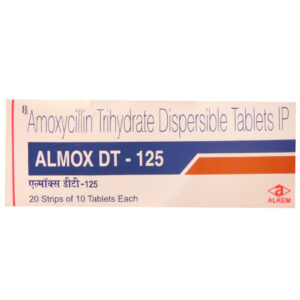Ciplox 500 mg
Ciplox 500 mg includes antibiotics known as fluoroquinolones, which are typically used to treat or prevent bacterial infections. Pneumonia, gonorrhea (a sexually transmitted disease), typhoid fever (a serious infection common in developing countries), infectious diarrhea (infections that cause severe diarrhea), and infections of the skin, bone, joint, abdomen (stomach area), and prostate are among the conditions for which it is prescribed (male reproductive gland). Bacterial infection is an infection caused by bacteria that develops in the body. It may target any portion of the body and multiply swiftly.
Ciplox 500 mg includes the antibiotic Ciprofloxacin, which can be used to treat and prevent a variety of bacterial illnesses. It works by destroying germs that cause illnesses and is bactericidal in nature. It stops bacterial cells from dividing. It also prevents bacterial cells from repairing themselves. It destroys the germs in its entirety.
Ciplox 500 mg should be taken according to your doctor’s instructions for dosage and duration. It is recommended that you take it with food and at a certain time to get the best results. Ciplox 500 mg should not be used with dairy products since it may reduce its effectiveness. You may develop nausea, diarrhea, abnormal liver function tests, vomiting, and a rash in certain circumstances. The majority of Ciplox 500 mg side effects do not require medical care and fade away with time. However, if the negative effects do not go away, see your doctor. Rashes, itching, swelling, shortness of breath, and other signs of an allergic reaction should be reported to your doctor right once.
To avoid unpleasant side effects, it is not recommended to discontinue using this prescription suddenly. If you have lung illness, muscular weakness (myasthenia gravis), a sleeping condition or difficulties sleeping (sleep apnoea), severe liver disease, or an alcohol or other prescription recreational drug issue, tell your doctor. If you are intending to get pregnant, are pregnant, or are breastfeeding, tell your doctor.
Bacterial infections are treated with Ciplox 500 mg.

Medicinal Advantages
Ciplox 500 mg includes the antibiotic Ciprofloxacin, which can be used to treat and prevent a variety of bacterial illnesses. It works by destroying germs that cause illnesses and is bactericidal in nature. It stops bacterial cells from dividing and hinders them from mending themselves. Both of these events result in the bacterium being killed.
Use Instructions
Ciplox 500 mg is a medication that may be taken with or without meals (excluding dairy products). Always follow your doctor’s instructions when using this medication. If you’re not sure, consult your doctor.
Storage
Store in a cool, dry location away from direct sunlight.
Ciplox 500mg Side Effects
Ciplox 500 mg, like other drugs, can produce adverse effects, but not everyone experiences them. If you experience nausea, diarrhea, abnormal liver function tests, vomiting, rash, or a change in heart rhythm (ECG) in people with low blood potassium, you should see a doctor. The majority of these adverse effects do not necessitate medical treatment and fade away with time. However, if the adverse effects don’t go away, talk to your doctor.
Drug Recommendations
If you are allergic to ciprofloxacin or any other quinolone or fluoroquinolone antibiotic, such as delafloxacin, gemifloxacin, levofloxacin, moxifloxacin, or ofloxacin, do not use Ciplox 500 mg. Ciplox 500 mg may raise the risk of tendinitis (inflammation of the fibrous tissue that links a bone to a muscle) or tendon rupture (tearing of a fibrous tissue that connects a bone to a muscle). If you have or have ever had a kidney, heart, or lung transplant, kidney disease, a joint or tendon disorder like rheumatoid arthritis (an auto immune disease of the joints that causes pain, swelling, and loss of function), seizures (fits), epilepsy, or if you engage in regular physical activity, tell your doctor. Ciplox 500 mg may exacerbate muscular weakness in patients with myasthenia gravis (a nervous system illness that causes muscle weakness) and lead to serious breathing difficulties or death. Ciplox 500 mg should not be used with dairy products. Furthermore, when using Ciplox 500 mg, exposure to sunlight should be avoided since it may induce increased phototoxicity or photosensitivity. Before using Ciplox 500 mg, patients with epilepsy and irregular heartbeat (particularly a condition known as QT prolongation) should notify their doctor.
Interactions Between Drugs
Blood thinners (such as warfarin), antidepressants and antipsychotics (such as clozapine, olanzapine), caffeine-containing medications, insulin or other anti-diabetic medications (such as chlorpropamide, glimepiride, glipizide, glyburide, tolazamide, and tolbutamide), medications for regulating irregular heartbeat (such as amiodarone, disopyramide, procainamide (like ibuprofen and naproxen).
Ciprofloxacin interacts with dairy products (such as milk or yogurt) or calcium-fortified drinks on their own.
Before taking Ciprofloxacin, tell your doctor if you have or have ever had a kidney, heart, or lung transplant, kidney disease, a joint or tendon disorder like rheumatoid arthritis (a condition in which the body attacks its own joints, causing pain, swelling, and loss of function), seizures, epilepsy, or if you engage in regular physical activity.
Safety Suggestions
ALCOHOL
When Ciprofloxacin is used with alcohol, no negative side effects have been reported. However, drinking alcohol while taking Ciprofloxacin might harm your liver. As a result, Ciprofloxacin should not be used with Ciprofloxacin.
PREGNANCY
Ciprofloxacin is classified as a pregnancy Category C drug. Ciprofloxacin’s effect on pregnant mothers and their fetuses is unknown. As a result, if you are pregnant or trying to get pregnant, you should avoid using Ciprofloxacin since it may damage the fetus.
BREAST FEEDING
Human milk contains ciprofloxacin, which is excreted. The quantity of Ciprofloxacin absorbed by a breastfeeding newborn, on the other hand, is unknown. As a result, it should not be used while nursing.
DRIVING
Ciprofloxacin has the potential to impair alertness and coordination. As a result, it is best to avoid using machinery that demands focus.
LIVER
Ciprofloxacin should be used with caution, especially if you have a history of liver problems. If you have nausea, vomiting, lack of appetite, dark urine, or yellowing of your skin or eyes, your doctor may need to alter your dose.
KIDNEY
Ciprofloxacin should be used with caution, particularly if you have a history of kidney illness. Your doctor may need to modify the dosage.
No habit formation
Advice on Diet and Lifestyle
Caffeine-containing items such as coffee, tea, energy drinks, cola, and chocolate should not be consumed in large quantities. Caffeine-induced uneasiness, insomnia, and anxiety may be exacerbated by Ciprofloxacin.
After finishing the complete course of Ciprofloxacin, probiotics should be used to restore any good bacteria in the intestines that may have been destroyed. Antibiotic-associated diarrhea can be reduced by taking probiotics following antibiotic therapy. Yogurt, cheese, sauerkraut, kombucha, and kimchi are examples of fermented foods that can aid in the restoration of healthy bacteria in the gut.
Include more fiber-rich foods in your diet since they are easier for your gut bacteria to digest, which aids in their growth. As a result, fiber-rich diets may aid in the restoration of healthy gut flora following antibiotic treatment. Include entire grains in your diet, such as whole grain bread and brown rice. While using Ciprofloxacin, make sure you drink plenty of water or other fluids every day.
When using Ciprofloxacin, avoid drinking alcoholic drinks since it might dehydrate you and disrupt your sleep. This can make it more difficult for your body to help Ciprofloxacin battle infections.
Additional Information : This item is non-refundable.
Glossary of Diseases and Conditions
A bacterial infection occurs when dangerous germs infiltrate our bodies, grow, and infect us. It may target any portion of the body and multiply swiftly. When bacteria infects you, you may have nonspecific symptoms such as fevers, chills, and exhaustion. Bacteria come in a variety of shapes, the most common of which are spherical, rod-shaped, and spiral-shaped. Bacterial infections range from simple ailments such as sore throats and ear infections to serious diseases such as meningitis and encephalitis. Streptococcus, Staphylococcus, and E. coli are some of the bacteria that cause illnesses. A bacterial illness can affect anyone at any time. People with weakened immune systems or those using immunosuppressive medications, on the other hand, are more susceptible to bacterial infection.
FAQs
Ciprofloxacin should not be taken with dairy products since it may reduce Ciprofloxacin’s absorption and effectiveness. You can, however, combine it with a meal that contains these foods or beverages.
Photosensitivity is a side effect of Ciprofloxacin, which makes your skin more sensitive to sunshine. As a result, extended sun or UV light exposure should be avoided. Always put on sunscreen before heading out in case of an emergency.
If you forget to take a Ciprofloxacin dosage, take it as soon as you recall. However, if the following dose is approaching, do not take a double dose to make up for a missed one.
Ciprofloxacin should be taken according to the doctor’s instructions for dosage and duration. It may produce unpleasant side effects if you take more than the prescribed amount. Please see your doctor if your symptoms do not seem to be better.
Ciprofloxacin is an antibacterial medication that only works against bacterial infections, not viral infections like the ones that cause cough, cold, and flu. Ciprofloxacin should not be taken without first visiting your doctor. Self-medication is risky and can reduce Ciprofloxacin’s effectiveness, leading to antibiotic resistance.
You may get diarrhea after using Ciprofloxacin. Ciprofloxacin is an antibiotic that kills or prevents bacterial development, therefore it’s possible that some beneficial intestinal bacteria that promote digestion will be destroyed as well. To avoid excessive fluid loss from the body (dehydration), drink lots of water and take probiotics.








Leave a Reply
You must be logged in to post a comment.